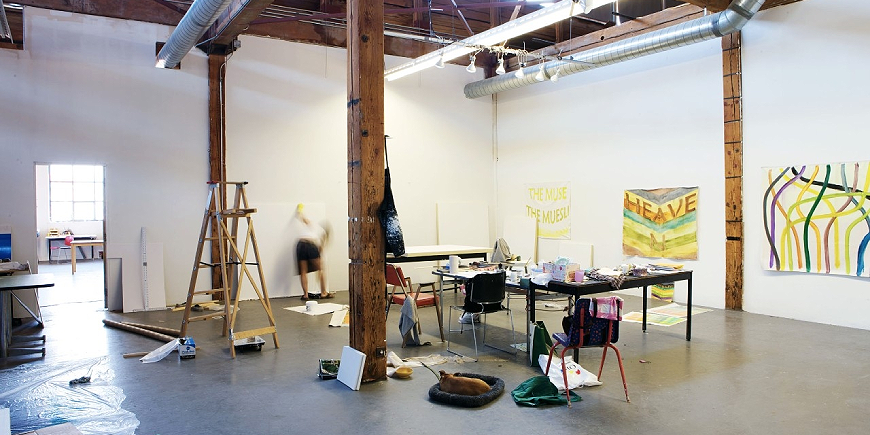
My name is Kevin Day and I am a practicing visual artist. I hold a MFA in Visual Art and I am currently pursuing a PhD in Curriculum Studies with a focus on visual art, pedagogy, and technology. I am also the interim Professional Development Advisor at the School for the Contemporary Arts, SFU.
This is a particular sequence of introducing myself to people I meet for the first time (artist first, day job second), one that is a conscious and deliberate decision. For artists, the relationship between their artistic practice to any notion of a professional vocation and career has always been a contentious one. Isn’t being an artist already a vocation in itself? Or, to go further, shouldn’t art distance itself from such instrumental language of the corporate field altogether? What is a professional artist? Within art theory there has long been a criticism towards the professionalization of artistic practice in the form of structured pedagogy (art schools, MFAs, etc.), housed within institutions that are themselves increasingly corporatized. It is within this entanglement, oscillating between diverse understandings of art and an unforgiving capitalist era, that I situate this discussion.
Professional development within contemporary arts, within a post-secondary setting especially, is problematic. What is the responsibility of the university? What does professional development for artists look like? To artists, that might mean doing work under the mentorship of an established artist or within a residency at a renowned institution, allowing the student to grow their practice, discuss research with colleagues, and make important connections. To others, that might mean undergoing training or obtaining experiences that would allow one to come out of school with applicable skills of one form or another that would make them employable in the traditional sense. Some would approach the idea of professional development with ambivalence and hesitance, as the two different understandings noted above point to the thorny situation within which art is situated, in relation to the rest of the university and the professional field.
What can the post-secondary institution do in this economic climate, within a field that is underfunded if not neglected and traditionally has long relied on free labour and apprenticeships? The arts is unlike any other industry. While many industries can support students in moderately well compensated cooperative education placements, the arts cannot, at least not without the support of a federal or provincial grant. The structure of unpaid internships that SCA offers (for academic credit) is part of this larger phenomenon of attempting to create a transition for students from the university to the professional field. It is important, before any further discussion, to acknowledge that unpaid and voluntary labour that is rampant in the arts is very problematic. From the entry level volunteer to the top-level board members, unfortunately it is expected that one will contribute much free time and labour in the arts.
Under this weighty premise, let us move forward then. Clearly there are innumerable ways to proceed with one’s artistic career. It depends on one’s goals, preferences, principles, personalities, expectations, and the particular balance of art-making, work, and life.
First, there is perhaps the ideal way for an artist to function: making a living off one’s practice. This will look slightly different depending on the discipline, but generally it would most likely involve the individual as the main creator with perhaps a colleague such as manager, dealer, producer, etc. Nevertheless, the basic idea remains: one is being remunerated based on producing and selling their work. From this point onwards, there are various permutations where one is creating and selling and/or getting paid for their work, as well as working in another capacity, and in addition to receiving support through grants. Most of my colleagues around me work a number of jobs, possibly running their own companies or organizations, while sustaining their practices, potentially with the support of grants and any revenue received from production. If we keep moving through the list, perhaps for some, the least desirable would be being employed at an organization doing a role that is completely unrelated to the arts, while attempting to maintain one’s practice on the side. Why is that? Speaking to a colleague of mine, we both agree that there seems to be a stigma when artists work in non-arts position, or even when artists work at all. To go back to the beginning of this piece, what is our understanding of way artists function vocationally?
Art students need to recognize that they will be operating amidst financial restraints, academic content that does not easily lend itself to employment, and a curriculum that does not often impart practical skillsets. On their own terms, one needs to spend time in the field, to make art and to make a living, to let these situations percolate, and to discover for themselves what works for them and what does not. Regardless of which one of the above mentioned working scenarios that an artist is aiming for, unanimously, getting out there into the field of one’s interest and interacting with the scene, is crucial. This can mean a number of things: volunteering, interning, socializing, participating in projects, going to talks, attending shows, being part of a production, etc. Making connections and growing one’s network with both mentors and peers is imperative in getting one’s name out there and gaining opportunities for further work, both artistic and vocational.
The gap between artistic work and professional work might be something that some wish to close over time, eventually getting remunerated sufficiently that one does not need to work in administration, freelance, teaching, communication, design, etc. For some, that gap is perfectly acceptable, if not sought-after. For most, perhaps, the gap will always exist, to one degree or another, where the balance of an artistic practice and a profession that remunerates will be crucial. This profession can be arts-related, such as within an arts organization or festival, or perhaps in a completely unrelated field, such as finance, marketing, government, trades, manufacturing, retail, healthcare, and social services. Getting into any such work might be a challenge, and this is not exclusive to the arts. If one is not armed with a resume with applicable skills right out of school, volunteering could be an option, which might lead to paid work if one is careful in choosing the responsibilities and organizations to intern for. There are also skills within the arts that can be generalized to other fields (ie. critical thinking, design, communication, project management, and teamwork). Unsurprisingly, personal connections are highly beneficial at this point, as they add to the imperative of engaging with the community. Residencies and grants are available and a prudent way of working on one’s practice while making connections as well. It would not be unwise to obtain experience at an unrelated position that could be transferable to another, more preferred position. All the while not stopping one’s practice, of course.
It is important to acknowledge the need to fund one’s practice (assuming, that one still wishes to be an artist, first and foremost). There can be no delusion in that regard. How one wishes to do so is their own choice, and everyone will have a different balance.













